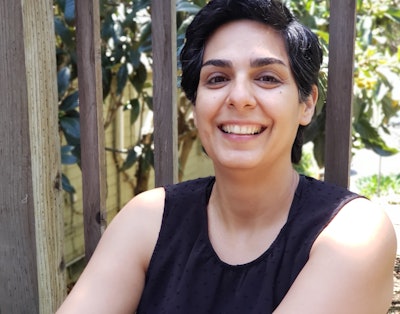A new report from Just Equations, a non-profit organization that seeks to re-envision mathematics to ensure greater educational equity, offers a playbook for redesigning college math pathways which have been a distinct source of inequity. “Solving for Equity: Design and Implementation of New Postsecondary Math Pathways” examines how math courses have often served as a gatekeeper to academic admission and academic majors for traditionally marginalized students, particularly Black and Latinx students.
 Dr. Mina Dadgar
Dr. Mina DadgarThe report includes a review of relevant literature and vital information gleaned from a distinguished group of scholars with expertise in math education. With that, Just Equations’ research team built strategies to increase equity and access that they hope will lead to academic success for students often stymied as they progress through education.
“Math has an important role as a gatekeeper that makes racial equity and gender equity in access to credentials that have labor market value even worse,” said Dr. Mina Dadgar, executive director of Education Equity Solutions and the lead author of the report. “It does not have to be this way. Mathematics education can be very helpful in helping students with the relevant critical thinking skills that they need to support them in different careers.
“If colleges and states work on defining rigor and relevance for mathematics, then mathematics education can be engaging and rich and relevant to what students want to study,” she added.
Remedial prerequisites, such as intermediate algebra, often discourage students from pursuing postsecondary degrees and credentials because these courses pose barriers to access. The report suggests replacing prerequisite remedial courses with corequisite courses and other types of embedded support.
“We have conceived of mathematics to be this very objective, neutral domain, and so we rely on those values of objectivity and neutrality to shape ideas around student ability,” said Dr. Luis Leyva, an assistant professor of mathematics education in the Peabody College of Education & Human Development at Vanderbilt University, who was one of the experts interviewed for the report.
What isn’t being considered, said Leyva, is how broader, sociopolitical structures disenfranchise students from racially minoritized backgrounds and other minoritized forms of social difference.
 Dr. Luis Leyva
Dr. Luis Leyva“Given relevant, engaging material, we see that students can, in fact, succeed in college,” Dadgar said.
The key point is designing pathways and courses based on inclusive notions of rigor and relevance. Dadgar said redefining rigor and relevance requires looking at what students need to know to succeed in various majors and careers.
The report noted that rigor should include problem-solving and reasoning skills that will be needed in future courses and in careers and that critical thinking, conceptual understanding and communication should be emphasized instead of procedural mastery.
“Coming up with the right curriculum requires that departments collaborate,” said Dadgar. “It requires math departments to actually go and have conversations with their colleagues in different departments to learn what competencies are needed.”
Dadgar said solving these issues are a lot for a single institution. States, she said, should take an active role in facilitating conversations across institutions and with the entities in the work world to provide information about the evolving needs of careers. Report recommendations include states providing funding for professional development and supporting research about equitable math instruction practices.
“We are hoping states see a role for themselves in facilitating conversations that lead to coherence across institutions and across departments and help bring in the needs of different careers into that conversation,” said Dadgar.
Also, noted in the report is institutional practices that foster students’ math identity and a sense of belonging. This involves promoting positive math classroom experiences with content relevance as well as addressing faculty and staff bias, said Dadgar.
Leyva said that practice requires faculty and staff to know what students want to do in their post-secondary pursuits and understanding the students’ experiences with math.
“Oftentimes, we think about teaching calculus and mathematics as teaching the content and it’s often disconnected from students’ lived experiences and students’ stories about their relationships with math, which are highly varied,” said Leyva. “If faculty members are able to rethink and reimagine their instructional practices to thinking about building relationships within the classroom or within office hours, you could have opportunities to ask students to share things about themselves in relation to mathematics.
“Those things kind of humanize the teaching and learning experience of mathematics and it recenters the students a bit,” he added. “In terms of pathways, we can think about approaching advising and sequencing of courses in ways where we’re learning from what students really aspire to do.”



















